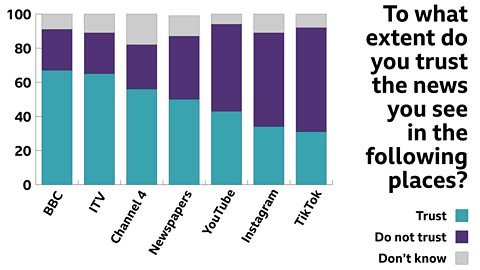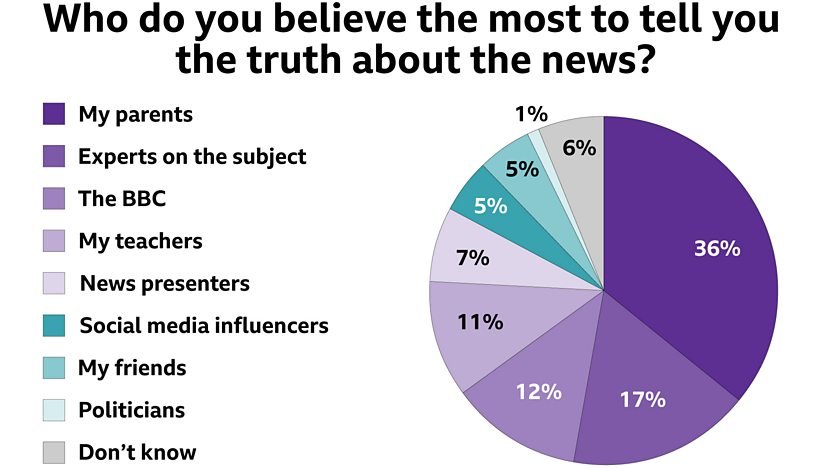How young people's trust in influencers could shape the future of news
When it comes to the news, teenagers trust social media influencers more than they do politicians. This is according to a new survey for BBC Bitesize. The survey found that almost half of teenagers surveyed (47%) said they trusted social media platforms to give them truthful news. Social media platforms beat out traditional news sources like the BBC, ITV, Channel 4, and YouTube.
Teens were also asked who they’d believe most to tell them the truth about the news and one per cent of them chose politicians while five per cent said influencers. So if you’re looking for someone to give you the scoop on what’s going on in the world, it looks like you’re better off following your favourite social media influencer instead of your local politician.
The new initiative is dedicated to presenting alternative viewpoints that few people are aware of, and it's backed by the BBC Bitesize project, which aims to help 11-16-year-olds make more sense of the news and information they encounter online every day.
More than nine out of 10 young people (89%) recognized what fake news was, but fewer than half said they would look for evidence to support their views and opinions. Sixty-six per cent said they would check with their parents before believing a news story they had seen or heard.
“It's critical that young people have access to credible and unbiased information about the issues that are important to them, so I am pleased to see this most recent research showing that the BBC is the most trusted news source for 11-16 year-olds.” “The Director General of the BBC said it was vital young people had access to trustworthy and accurate information on the topics that matter to them.
Our Other Side of the Story campaign
“Our Other Side of the Story campaign will provide young people with the skills to evaluate the information they encounter and how to find trustworthy sources, whether it's in print, broadcast, or on the internet.”
The aim of the Other Side Of The Story campaign is to equip secondary school students with media literacy skills and the tools to understand how echo chambers, internet algorithms, unconscious bias, as well as fake news and misinformation can impact their perceptions of the world.
More than 2,000 children aged 11 to 16 in England, Scotland, Wales, and Northern Ireland were interviewed.
Sixty-two percent of those who said they had spread false news online later regretted it. Around a third (30%) get their news from Tik Tok, according to those who shared fake news online. Among people who get their news from social media, one in five (19%) says they get it from TikTok.
However, only 19% of respondents feel that TV presenters represent them, whereas 40% say they would be more inclined to watch news on television if the personalities were more like them.
“A lot of young people are still confused about where to go to get trustworthy information,” says Helen Foulkes, Head of BBC Education. “They're moving away from more traditional news sources but aren't sure if what they see and hear in other places can be trusted.
“By providing resources that help young people think more deeply about where news is coming from, whether it’s balanced or biased, fact or opinion or simply just made up, we’re hopeful we can arm them with the tools to feel much more confident about what they see and share in the future.”
What are the objectives of the campaign?
The videos and workshop plans will be made available to all schools on the BBC Teach website later in the year as part of the Other Side Of The Story campaign. From September, BBC Bitesize will run a series of workshops in schools across the UK, with the films and workshop plans open to all schools via the BBC Teach website.
The national and regional winners of the BBC Young Reporter contest have been announced to mark the start of the new campaign, with more winners than ever before from all nations and regions in the UK.
The winners will collaborate with BBC journalists, producers, and program makers to prepare their story for broadcast across the BBC, including on The One Show, BBC Breakfast, BBC Three, BBC News, and BBC Local Radio programs as well as online and social media platforms during the broadcaster's centennial year.
Newsround has handpicked 15 stories, all of which are from 11-13 year olds, for online coverage throughout the year. There will be reports about being a young carer to being addicted to internet gaming.
Is it a good idea? What are your thoughts on that? How do you keep up with the latest news? Tell us in the comments.
Please remember to keep your comments respectful and constructive. Thank you for reading! :)



